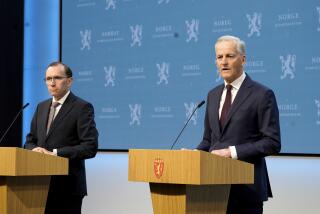NEWS ANALYSIS : Germany Making Its Presence Felt : Europe: No longer timid about pressing for its political interests, it recognizes Croatia and Slovenia.
BERLIN — In a development signaling that Germany is beginning to flex the political muscle that came with unification 15 months ago, Chancellor Helmut Kohl’s Cabinet on Thursday became the first major Western government to formally recognize the breakaway Yugoslav republics of Croatia and Slovenia.
That decision, which came at an evening Cabinet meeting, is part of an agreement worked out among European Community foreign ministers earlier in the week. Under that accord, Bonn agreed not to implement the recognition until mid-January.
But Thursday’s decision signals that, at least in Europe, a reunited Germany is once again a power to be reckoned with--a nation willing to press for its political interests in a way that a divided, quasi-sovereign West Germany neither could nor would. In the Yugoslavia conflict, Germany pressed hard and won the EC commitment conditionally to recognize the two republics, despite strong American and British pressure. Those two countries argued such a move spelled the end of the tattered Yugoslav federation.
Bound to both republics by history (the two republics were part of the Austro-Hungarian Empire, which was allied with Germany in World War I) and the Roman Catholic religion, Germany saw it otherwise.
“A great success for German and for European policy,” declared an elated Kohl.
That the move came in a week when Kohl’s Christian Democrats approved a new party platform-- which calls both for a more forceful foreign policy and a repeal of the constitutional ban that has kept German military forces from venturing beyond North Atlantic Treaty Organization territory--reinforces the message that Germany now wants to accept a greater role.
The demise of the Soviet Union and the economic crisis of its debris can only act to accelerate this process.
Despite all this, however, distinct limits remain on German political power--limits dictated not just by the lingering mistrust of a land that spawned Nazism but also by the country’s post-World War II experience as the primary benefactor of consensus politics and the doctrine of collective security. Both are likely to dampen any German urge to move with the same singular self-interest that sometimes characterizes the actions of France and Britain.
Well over a year after unification, standing alone on an important issue remains Bonn’s great foreign policy nightmare.
While Germany’s closest continental ally, France, is content carving its own special positions outside of NATO, and British leaders never seem happier (or more popular at home) than when they manage to get all 11 other European Community states attacking them simultaneously, there is no appetite in Germany for such tactics, either among the political leadership or the German public.
The trauma of being isolated from key allies showed especially during the Gulf War.
Indeed, in many ways, Germany’s actions in the Yugoslavia crisis underscore the country’s need for diplomatic companionship.
After being widely attacked earlier this year by the United States and European neighbors for being too eager to recognize the two Balkan republics, Foreign Minister Hans-Dietrich Genscher quickly shifted gears.
Despite growing domestic pressure, he lowered the tone of his rhetoric, then, working for months behind the scenes, quietly built a coalition that included other European allies--German Foreign Ministry officials say Austria, Denmark, Italy, France and Belgium all were on board--before once again returning to the offensive.
Germany may have led the way toward the decision to recognize Slovenia and Croatia, but when the decision came, it was no longer alone.
To stay that way, Bonn pulled back at the last minute from its plan to recognize the two republics Thursday, instead settling for a compromise of formally extending the recognition at an evening Cabinet meeting but not implementing the decision until mid-January.
The same instincts were visible at last week’s EC summit in Maastricht, the Netherlands, where Germany was also visibly more interested in coalition-building and not getting “too far out in front.”
While Kohl got most of the protective guarantees he wanted for the mighty deutschemark in the treaty on Economic and Monetary Union, he backed off on key points in the political union treaty, including his demand for a strengthened European Parliament, which he had earlier insisted was vital to the whole package.
“The path to European unity has always been driven by compromise,” Kohl explained at a post-summit press conference.
But others wondered why the Germans weren’t pushing harder.
The answer lies partly in the country’s allergy to being left alone but also in Genscher’s style.
Under his guidance, the cornerstones of German foreign policy have been anchored in multilateral bodies--the European Community, NATO, the West European Union and the Conference on Security and Cooperation in Europe.
His tactic has always been to seek consensus, knowing that Germany cannot afford head-on diplomatic conflicts, his tactics have always been to seek consensus.
That legacy may have been eroded slightly in the Yugoslav crisis but only slightly. It remains a powerful influence in Bonn.
On the day that Germany recognized Croatia and Slovenia, Iceland did the same, saying it wants to establish diplomatic relations with the breakaway Yugoslav republics as soon as possible.
More to Read
Sign up for Essential California
The most important California stories and recommendations in your inbox every morning.
You may occasionally receive promotional content from the Los Angeles Times.










